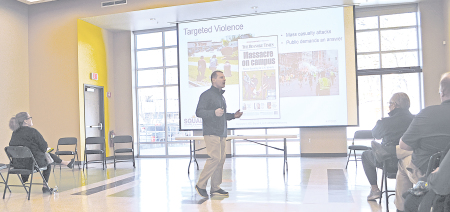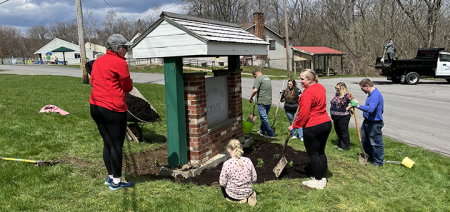Commerce Chenango Superintendent Summit Identifies Opportunities For Professional Development
Published:
February 29th, 2024
By:
Sarah Genter
 Commerce Chenango President and CEO Sal Testani at the Superintendent Summit on February 22. The meeting brought together county businesses and school officials to discuss the development of micro-credential programs. (Photo by Sarah Genter)
Commerce Chenango President and CEO Sal Testani at the Superintendent Summit on February 22. The meeting brought together county businesses and school officials to discuss the development of micro-credential programs. (Photo by Sarah Genter)
CHENANGO COUNTY — On Thursday, February 22, Commerce Chenango hosted a Superintendent Summit to explore opportunities for micro-credential development, which would teach new high school graduates valuable skills that could help them land a job.
Representatives from local businesses and superintendents from local school districts and BOCES, as well as SUNY Morrisville Norwich Campus Director Tom Pilewski, were in attendance to discuss what skills employers are looking for in potential employees, what skills training programs already exist for local students, and three proposed micro-credential programs.
Businesses in attendance included Preferred Mutual, BlueOx, Raymond Corporation, NBT Bank, BOCES, SUNY Morrisville, sfcu, and more, and the event included presentations by Pilewski as well as sfcu Marketing Manager Anna Banks and BOCES Superintendent Mike Rullo.
Commerce Chenango President and CEO Sal Testani said a majority of county students aren't going on to college or the military after graduating high school: approximately 53 percent of students don't plan to attend college, and of those that do go on to college, only about 19 percent complete their degree.
With a large majority of Chenango County students entering the workforce after high school, and the high number of available jobs in the county, the goal is to provide training opportunities that align with the needs of local businesses to both get students jobs and fill open positions in the area.
"We have hundreds of job openings that are available throughout the county, and they all say entry level jobs that are open for a GED or above, but kids can’t get those jobs because they don’t have the practical skill sets," Testani explained. "Students in school are taught how to be prepared to go to college. So all we’re saying is, take the work that BOCES does and combine that with this concept that we’re talking about that Morrisville does called micro-credentials."
Micro-credentials are programs for students who don't want to commit to a full degree program, but want to learn new skills. In these programs, students take one to two courses over two semesters, and graduate with a certification or micro-credential.
The SUNY Morrisville Norwich Campus currently offers a 21-credit Direct Support Professional (DSP) certificate program, and are nearly finished with the development of for-credit micro-credential programs in customer relationship/marketing, human resources management, business startup, and Microsoft Office.
The campus has also been working with local school districts, businesses, and Commerce Chenango to develop non-college credit micro-credential programs that would teach graduating high schoolers skills needed to enter the local workforce.
"In the customer service days, you would have had to take a six-week training program that told you how to handle a credit card, when to escalate, how to put somebody on hold, how to construct an email, all protocol before you ever got to sit and answer the phone next to someone," Testani said. "So if we could teach that same thing in a classroom, if we could have a proficiency exam that was created by our businesses, I promise you our businesses would give those kids a try. That’s what we're trying to do right now."
Area businesses completed a survey describing what skills are most important to them in prospective employees. Common responses included work ethic, independent problem solving, time management/attendance, basic computer skills, customer service, critical thinking, organization, and more.
Those results helped guide ideas for micro-credential programs, and the three ideas proposed were programs in customer service, material movement for factory or warehousing industries, and professionalism, which covers soft skills development.
The plan is for SUNY Morrisville and BOCES to teach the micro-credential courses, but local businesses have been asked to help develop the curriculum for these programs.
"If I had a kid that told me they came out of high school and they know how to handle a credit card, they know how to escalate a phone call, they could demonstrate that they could construct an email, they knew when to reach to their supervisor, I’d have given them a chance," Testani said. "So if we could create a credential like that, I’m pretty positive I could get kids jobs. We just need help doing that."
The group also explored various aspects of micro-credential development, such as how many hours per week or semester would be needed, hands on learning needs, and a competency-based approach to ensure students have truly learned the skills being taught.
Pilewski also said the Norwich Campus is working with Commerce Chenango on a grant application that would allow them to provide aid to students who can't afford tuition for the programs. Attending businesses brought up the possibility of employers paying the tuition for new hires.
Commerce Chenango, county school districts, and local businesses will continue to collaborate on the development of micro-credential programs, and Testani said they hope to have a curriculum by September.
Author: Sarah Genter - More From This Author
Comments








